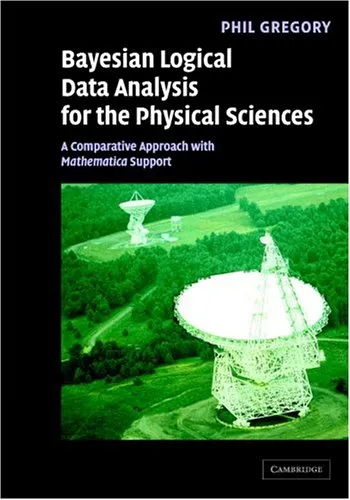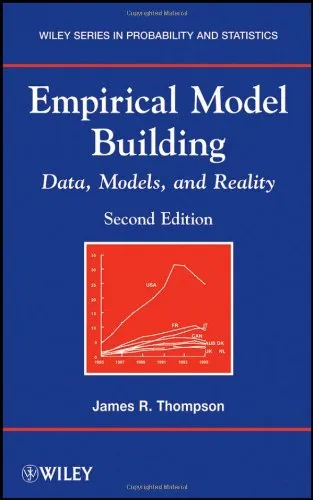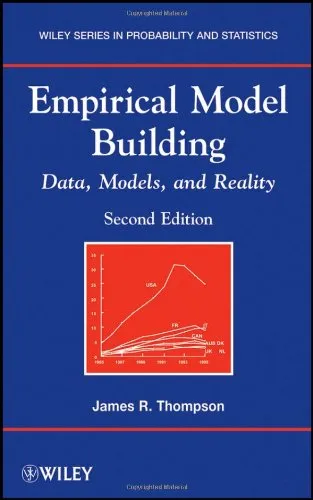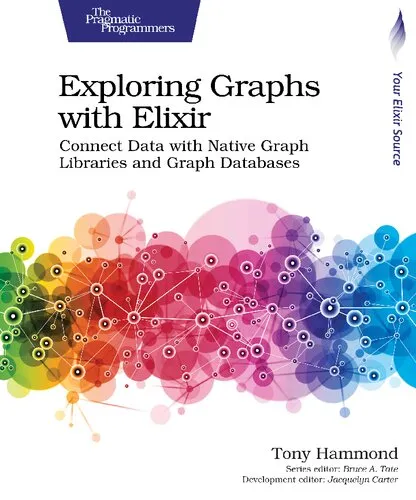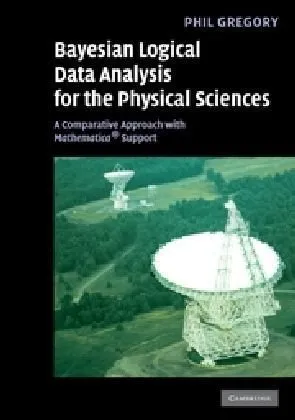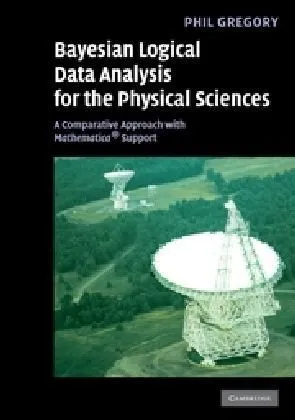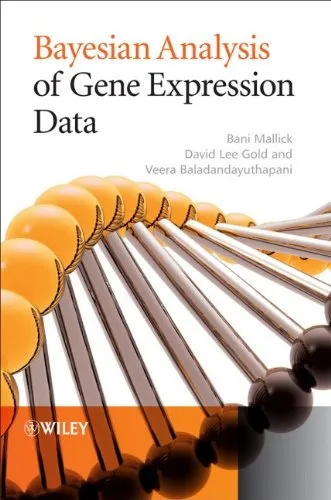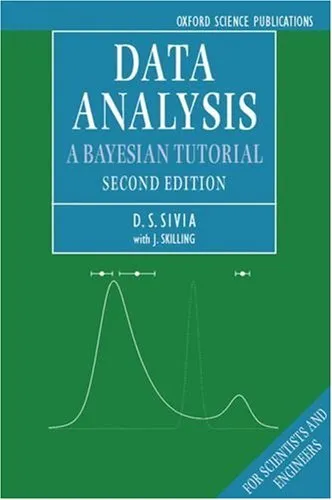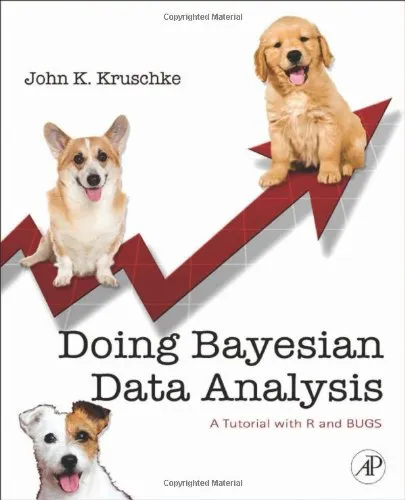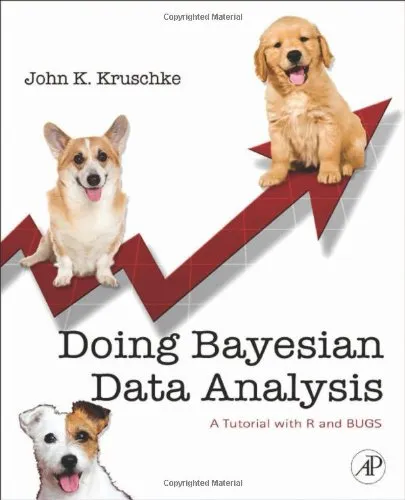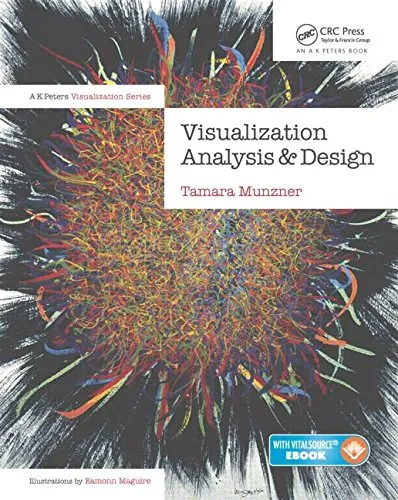Bayesian Logical Data Analysis For The Physical Sciences - A Comparative Approach With Mathematica
4.5
بر اساس نظر کاربران

شما میتونید سوالاتتون در باره کتاب رو از هوش مصنوعیش بعد از ورود بپرسید
هر دانلود یا پرسش از هوش مصنوعی 2 امتیاز لازم دارد، برای بدست آوردن امتیاز رایگان، به صفحه ی راهنمای امتیازات سر بزنید و یک سری کار ارزشمند انجام بدینکتاب های مرتبط:
معرفی کتاب
کتاب "Bayesian Logical Data Analysis For The Physical Sciences - A Comparative Approach With Mathematica" به نویسندگی فیل گریگوری، یک منبع جامع و نوآورانه است که به معرفی و کاربرد روشهای بیزی در تحلیل دادهها برای علوم فیزیکی میپردازد. این کتاب با استفاده از نرمافزار Mathematica به تحلیلهای مقایسهای پرداخته و به طور خاص برای محققان و دانشجویان حوزههای فیزیک و علوم مرتبط طراحی شده است.
خلاصه جامع کتاب
کتاب با ارائه مقدمهای بر اصول بیزی آغاز میشود و به تبیین این مفهوم میپردازد که چگونه این رویکرد میتواند یک ابزار قدرتمند برای تحلیلهای آماری در علوم فیزیکی به شمار رود. در ادامه، گریگوری به بررسی نحوه پیادهسازی تکنیکهای بیزی با استفاده از نرمافزار Mathematica پرداخته و مثالههای بسیاری از علوم فیزیکی ارائه میکند. این کتاب به گونهای ساختاربندی شده است که خواننده بتواند به راحتی مفاهیم پیچیده را درک کند و به کار گیرد.
مفاهیم کلیدی
- درک بنیادین از نظریه بیزی و کاربرد آن در تحلیل دادهها.
- پیادهسازی تکنیکهای بیزی با استفاده از Mathematica.
- تحلیل تطبیقی بین روشهای بیزی و دیگر روشهای آماری سنتی.
- ارائه مثالهای کاربردی در زمینههای مختلف علوم فیزیکی.
نقلقولهای معروف از کتاب
"بیزی بودن بیش از یک دیدگاه آماری است؛ این یک روش منطقی برای ارزیابی اطلاعات در مواجهه با عدم قطعیت است."
"Mathematica این امکان را فراهم میکند که تحلیل بیزی را به سطحی نوین از دقت و کارآمدی برسانیم."
چرا این کتاب مهم است؟
این کتاب در زمانی منتشر شد که نیاز به رویکردهای تازه و جامع در تحلیل دادههای علمی بیش از پیش احساس میشد. استفاده از روشهای بیزی در علوم فیزیکی میتواند در نتایج و یافتههای تحقیقاتی بهبود چشمگیری ایجاد کند. ظرفیت بالای Mathematica در پردازش دادهها و تجسم تحلیلها، این کتاب را به یک منبع ارزشمند برای متخصصان، پژوهشگران و دانشجویان تبدیل میکند. همچنین، گریگوری با نویسندگی روان و توضیحات دقیق خود، راهنمایی کارآمد برای هرکسی که به دنبال درک عمیق از تکنیکهای بیزی است، ارائه داده است.
Introduction to Bayesian Logical Data Analysis For The Physical Sciences - A Comparative Approach With Mathematica
Welcome to an in-depth exploration of Bayesian logical data analysis, a crucial tool for scientific research. This book delves into the methodologies and applications of Bayesian inference in the physical sciences, enriched with comparative analysis and practical guidance using Mathematica.
Detailed Summary of the Book
In "Bayesian Logical Data Analysis for the Physical Sciences," I, Phil Gregory, offer a comprehensive examination of Bayesian probabilistic methods as an alternative to frequentist statistics in analyzing physical science data. The book bridges the gap between theory and practice, providing scientific researchers and students the footing to implement Bayesian techniques in their own work.
The book is structured to guide readers from the foundational principles of probability and logic to the intricate workings of Bayesian inference. Empowering readers to harness Mathematica software effectively, it lays out how to apply Bayesian methods to data analysis scenarios frequently encountered in physical studies. As you progress through the chapters, the methodologies shift from theoretical underpinnings to case studies and real-world applications, strengthening the understanding of Bayesian techniques through progressive learning.
Key Takeaways
- Understand the fundamental concepts of Bayesian statistics and how they differ from classical frequentist approaches.
- Gain proficiency in using Mathematica for Bayesian data analysis, leverage built-in functions and create custom scripts for specific statistical challenges.
- Learn to approach data analysis with a logical, evidence-based mindset, enhancing the robustness and validity of scientific conclusions.
- Appreciate the importance of prior information and how it can be systematically combined with new data to inform posterior probabilities.
- Explore detailed examples and case studies that illustrate the application of Bayesian methods across various physical sciences domains.
Famous Quotes from the Book
"The ideal habit of mind for a Bayesian thinker requires a deft balance of skepticism and openness—challenging assumptions while welcoming evidence."
"In Bayesian terms, data is simply another form of evidence, and we must be ever vigilant in the pursuit of truth through informed inference."
Why This Book Matters
This book is pivotal for several reasons. First, it democratizes access to Bayesian methodologies by providing clear, accessible expositions coupled with practical tools. By utilizing Mathematica, a powerful computing language, the book offers an intuitive platform to perform computations, visualize results, and explore the ramifications of Bayesian analysis—transforming complex mathematical operations into tangible insights.
The impact of adopting Bayesian thinking in the physical sciences cannot be overstated. As datasets grow in volume and complexity, the ability to incorporate prior knowledge and flexibly update beliefs with new evidence becomes increasingly critical. Bayesian methods offer superior adaptability and rigor, positioning researchers to draw more meaningful conclusions from uncertain data.
Moreover, this book underscores the growing importance of interdisciplinary approaches in scientific inquiry. By effectively integrating statistics, logic, and computational tools, it provides a roadmap for the modern scientist to more accurately model the uncertainties inherent in empirical research.
دانلود رایگان مستقیم
شما میتونید سوالاتتون در باره کتاب رو از هوش مصنوعیش بعد از ورود بپرسید
دسترسی به کتابها از طریق پلتفرمهای قانونی و کتابخانههای عمومی نه تنها از حقوق نویسندگان و ناشران حمایت میکند، بلکه به پایداری فرهنگ کتابخوانی نیز کمک میرساند. پیش از دانلود، لحظهای به بررسی این گزینهها فکر کنید.
این کتاب رو در پلتفرم های دیگه ببینید
WorldCat به شما کمک میکنه تا کتاب ها رو در کتابخانه های سراسر دنیا پیدا کنید
امتیازها، نظرات تخصصی و صحبت ها درباره کتاب را در Goodreads ببینید
کتابهای کمیاب یا دست دوم را در AbeBooks پیدا کنید و بخرید
1317
بازدید4.5
امتیاز0
نظر98%
رضایتنظرات:
4.5
بر اساس 0 نظر کاربران
Questions & Answers
Ask questions about this book or help others by answering
No questions yet. Be the first to ask!
